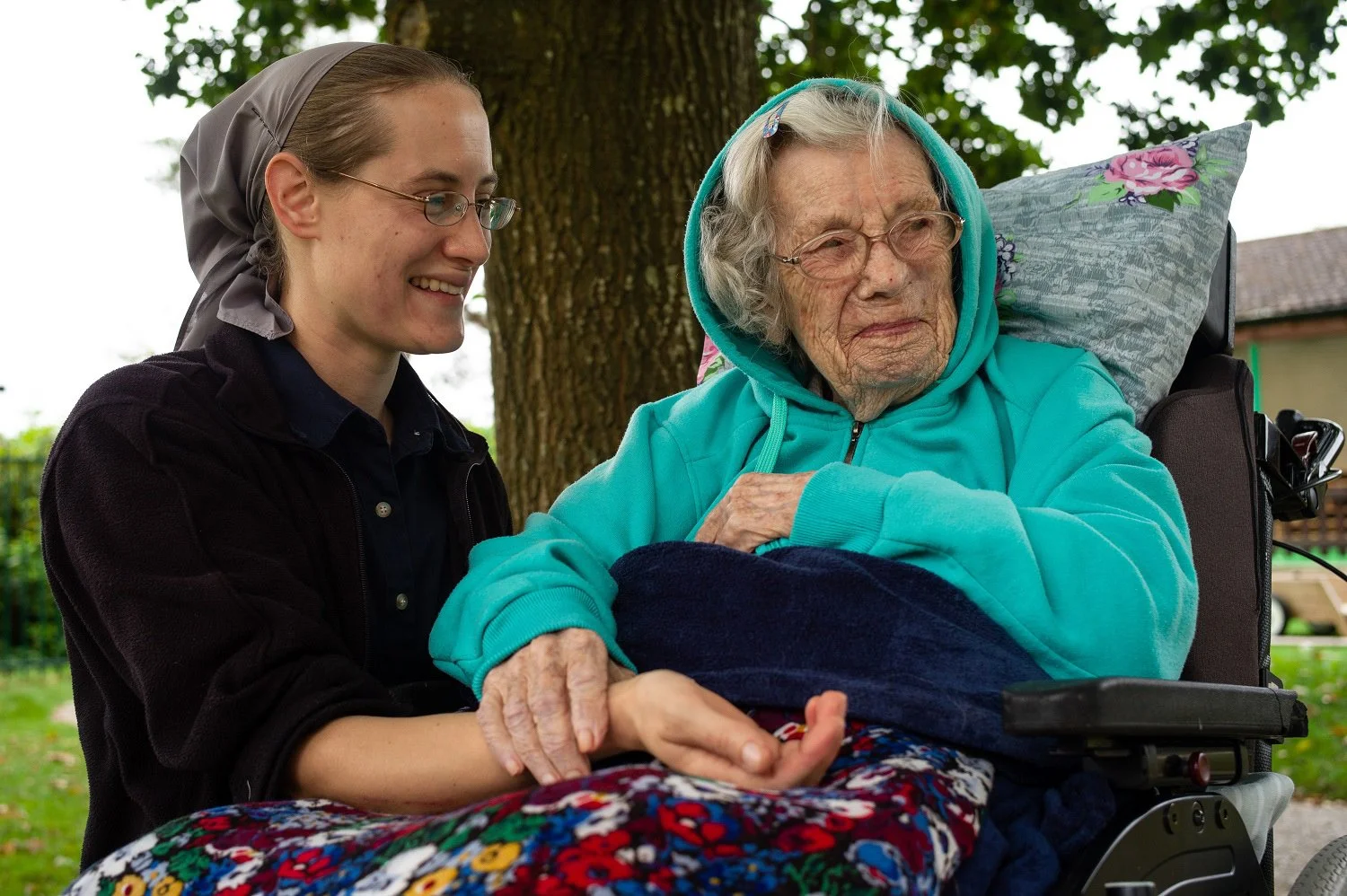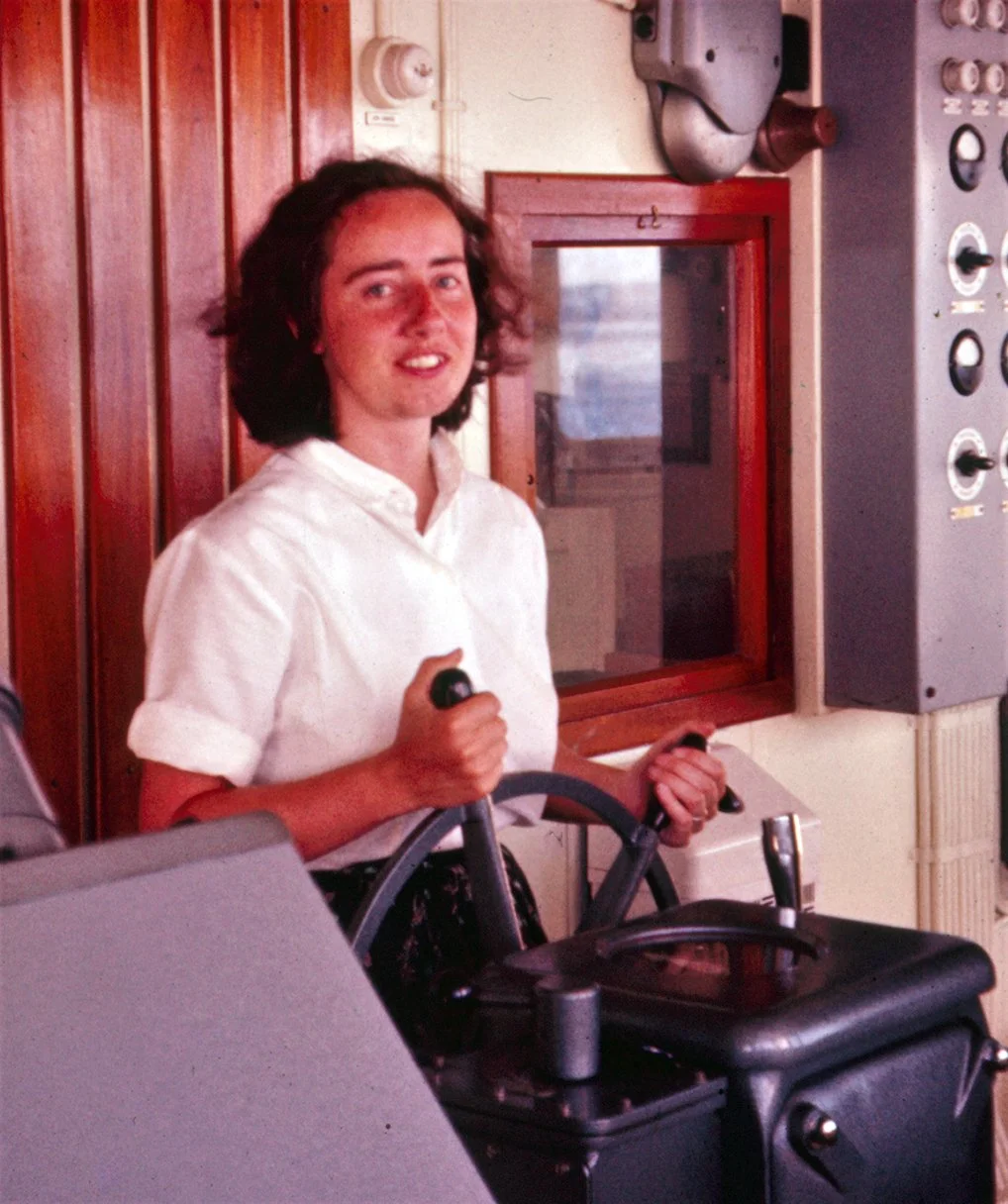Homecare in the Golden Years
August 5, 2020 by Coretta Thomson
Darling, I am growing old,
Can’t remember what I’m told.
But I think I will survive:
I have helpers with good eyes.
My grandmother Collette was improvising as we plodded down the hallway to our apartment arm in arm, our steps and her cane marking the downbeats. Her musical parodies, coined at a moment’s notice, were the soundtrack to our life. Perhaps she developed the skill composing little ditties to entertain her eight children.
Grandma was in her late eighties when I moved in with her and Grandpa to take on her care with help from other members of the Platte Clove Bruderhof. But sixty years before, she had earned a Masters in Philosophy, volunteered in Appalachia, and worked under A.J. Muste as an editor at Fellowship magazine in New York City. A bicycle trip to a fledgling “commune” upstate changed her life; she returned to Woodcrest a few years later. There she fell in love with Dick Thomson, a quiet young cellist who had studied Physics at Cornell.
Grandpa and Grandma married in 1958. They worked at the community’s mission hospital in Paraguay for three years, and later lived in several locations in New York’s Hudson Valley. A favorite childhood memory of mine was listening to my dad and uncles reminisce about the hair-raising adventures they had embarked on while Grandpa was working as a microbiologist at the Ashokan Reservior and Grandma was – well, doing just about everything! Her cooking and baking skills were widely acclaimed and, once most of her kids had left the house, she worked as a copy editor and secretary. Then dementia slowly robbed her of control over her life. Grandpa cared for her lovingly, and their married children took turns living next door. But eventually it all became too much.
These were golden years. Families with small children invited us to Sunday dinners, where Grandma always managed to make new friends before the rest of us. Her humor was contagious, and often inappropriate. It came out in witty comments, creative medleys of hymns and folksongs, and delightful histrionics as we walked into a Sunday service. It was difficult to see her lose her dignity, especially for Grandpa. But we were blessed: her dementia was generally happy. Every minute was a new minute. She was literally incapable of holding a grudge.
The years went by, and Grandma needed more help. She had already outlived the most optimistic doctor’s prognosis by almost a decade, so it was no wonder. After over fifty years of living together, Grandpa let me and a few other young women take turns doing the nightshift. As a licensed practical nurse, I could do some advanced care, and her doctor stopped by regularly or was just a phone call away. We acquired medical equipment from Rifton Equipment, the same items for which Grandma had made product guides.
Leaving Grandma three months before her passing is one of the hardest things life has thrown at me. But my work required that I move to a different Bruderhof community. As much as I missed them, I knew that I did not need to worry about leaving them alone. Grandma was surrounded by love to the end, and I was close enough to visit occasionally, to say goodbye, and for the funeral. She passed away in the early hours of a dew-soaked dawn in late May.
So I was not there when Grandma took her last breaths, but she is not the only person I have cared for. A few years earlier, I had been part of the care teams for two other elderly women during their final months of life. One had lived in the Bruderhof for ninety of its (then) ninety-four years, since the first community house in Sannerz, Germany. She was a walking cultural history book: the smell of raspberry jam would spark detailed descriptions of the best raspberry patch near the settlement in the Rhön hills where she had spent her school years. The other woman had come to the Bruderhof with her mother in 1931 and had endless adventures to recount about her life in Germany, Liechtenstein, England, Paraguay, and the United States. I still feel like part of their families, just as the friends who took my place with Grandma will always be part of mine.
Thanks to the privilege of working homecare, I can remember each of these patients (and many others) as amazing people, good friends, and life-changing mentors. I don’t remember their meds, treatments, or diagnoses – what defines them was, and is, who they were. In recent years, I’ve had opportunities for study, travel, and a job change – first earning a degree in Humanities in Montevideo, Uruguay and now working as a contributing editor for Plough Publishing – and the lessons I learned from those I cared for have never left me.
Interestingly enough, personalized homecare models that allowed patient–caregiver relationships to blossom was the norm in this country until after World War II. Then, according to Atul Gawande in his bestseller Being Mortal, a combination of postwar medical advances slowly changed hospitals from places you went to die to institutions that could cure you. Societal and demographic shifts also contributed: people lived longer and, with the sandwich generation spending more time out of the house and hospitals filling up with post-op patients, Congress allocated funding in 1954 for hospitals to build long-term care units. Thus, continues Gawande, referring to the current typical nursing home, “we end up with institutions that address any number of societal goals – from freeing up hospital beds to taking burdens off families’ hands to coping with poverty among the elderly – but never the goal that matters to the people who reside in them: how to make life worth living when we’re weak and frail and can’t fend for ourselves anymore.” There have been pushback movements, from hospice to assisted living to homecare. Still, as I experienced first-hand recently, these models are not the norm in the modern eldercare industry.
Collette Thomson on the ship that took her and Dick to Paraguay shortly after their wedding in 1958
So I feel privileged to work in an environment where healthcare is not normal. Personalized, one-on-one care can be a privilege for both caregiver and patient. Incidentally, such holistic care is also probably the only way to truly “conquer” old age. It doesn’t let disease or disability trap the real person inside, rather it draws them out, so they can keep blossoming until the end. However, caregiver stress can be very real. I only managed the intense nursing schedule because I was part of a team of community members – nursing staff, coworkers, friends, pastors – who accompany each senior through her final years. This homecare model still works in the Bruderhof because we live in community. It does sometimes come at a sacrifice: when a community has a lot of people who need care or companionship, other members may have to put in more overtime in the factory or other areas of communal work. But caring for each other is given priority. Relationships make life worth living.
And the last years are a meaningful part of life’s journey when walked together with others. As Grandma noted one birthday, pointing to the sky, “we’re all getting older, but we’re all going in the same direction.”
Coretta Thomson is a contributing editor for Plough Publishing.


